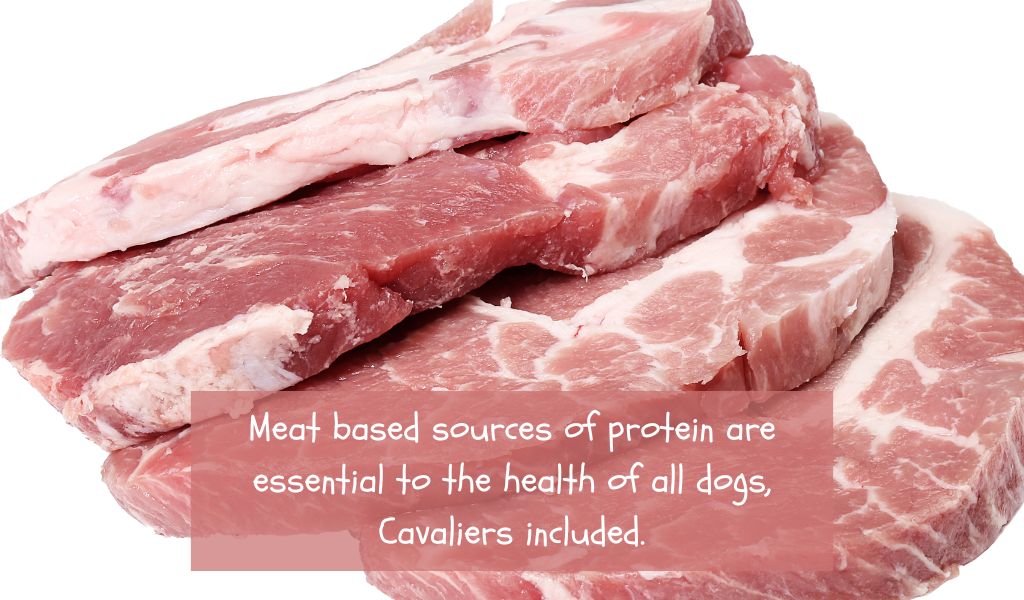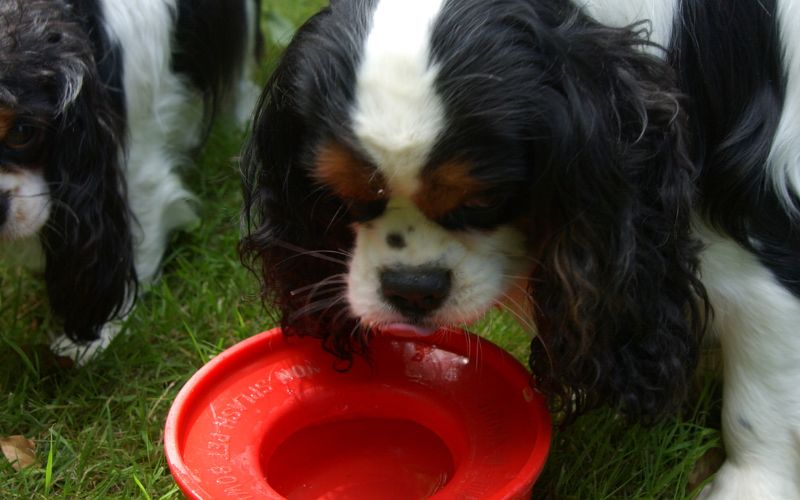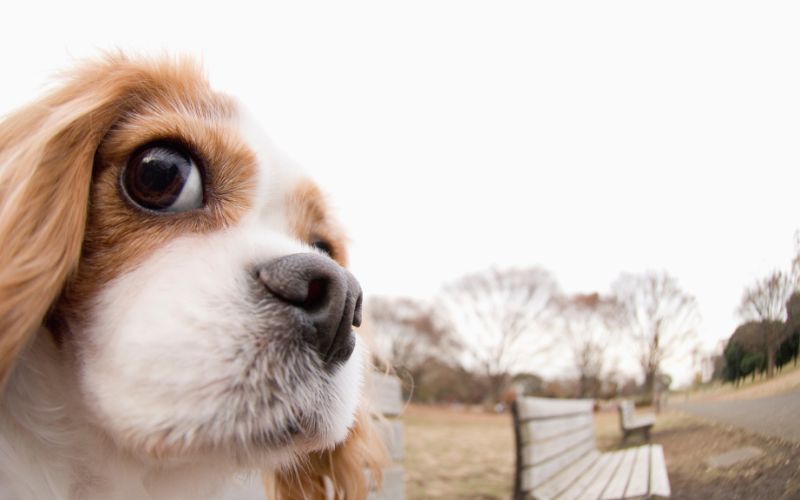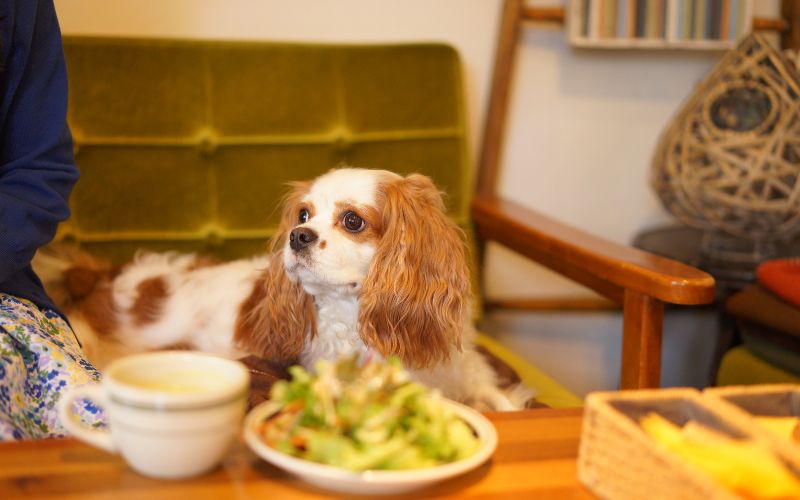If you’re a Cavalier King Charles spaniel owner, you know that they can be a little bit fussy when it comes to their food.
There are a number of ways that you can make sure your Cavalier is getting the nutrition he or she needs, without having to worry about them being picky.
It’s important for your Cavalier King Charles to get the right nutrition to maintain his or her health. Always feed a high quality dog food that is based around meat protein to ensure that your Cavalier is getting the correct balance of nutrients in their diet.
Feeding manufactured dog foods
Feeding a commercially produced dog food is always a good option as they are complete and contain all the nutrients your Cavalier needs.
What to look at when choosing a food for your Cavalier
There are a number of things you should be aware of when feeding your Cavalier manufactured foods.
Ingredients
When looking at the ingredients list on any pet food packet, it is important to ensure that meat is listed as the first ingredient.
This is especially important for Cavalier King Charles spaniels as it is for all carnivorous animals such as dogs.
Protein levels
Cavaliers need a diet that is around 18% protein in order to maintain their muscle mass and keep their energy levels up.
However, it is important not to overfeed them as this can lead to obesity and other health problems.

Fat levels
While fat is an important part of any diet, too much fat can be detrimental to your Cavalier’s health.
Cavaliers need a diet that is around 5% fat in order to maintain their weight and keep their energy levels up.
Fibre levels
Cavaliers need a diet that is high in fibre in order to maintain their digestive health. Fibre helps to keep the digestive system working properly and can also help to prevent constipation.
Manufactured dog foods will often have the nutrient levels clearly listed on the packet so it is always worth checking before you buy.
Cavaliers can suffer from food allergies
You should always aim to feed the best possible dog food, regardless of breed.
Cavaliers can experience skin problems and other allergies that can be aggravated by cheap dog foods. This is often because cheap foods use lots of fillers which include grains and cereals.
Look for meaty foods or try feeding your Cavalier a raw diet, such as tripe, to see if this helps with any allergies.

Feed your Cavalier twice a day
Many breeders choose to feed their adult dogs twice a day and this is something that you can continue with your Cavalier.
Start feeding your Cavalier twice a day from four to six months old and if they seem to be doing well on this regime, then stick with it.
This will help to ensure that they are getting all the nutrients they need and will also help to prevent weight gain.
Dogs enjoy routine at feeding time
Dogs generally enjoy routine and this extends to their mealtimes.
If you can, try to feed your Cavalier at the same time each day. This will help them to know when it is time to eat and will also make mealtime more enjoyable for them.
Try to feed in the morning and afternoon at the same times.
Your dog will become used to eating at these times and will be ready to do so when the food is presented.
Give your Cavalier small meals
Cavaliers are a small breed of dog and as such, they should be given small meals.
This will help to prevent them from becoming overweight and will also make it easier for them to digest their food.
It is better to give your Cavalier two small meals throughout the day rather than one large meal as, not only will this result in improved eating and less waste, it will help to keep their energy levels up.
Don’t constantly change foods
A common mistake that many Cavalier and other dog owners make is that of constantly changing their dog’s food whenever he or she seems to be getting fussy.
If your Cavalier stops eating ( and they are fit and well ) then you should simply remove their food and give it back to them at the next mealtime.
Avoid giving them any treats or other food.
Your dog will soon get the message and will eat when they become hungry.
If you always change foods or give treats then you’ll create a fussy eater.
Be sensible with treats
Treats are often used as a training aid but it’s important to be sensible with them.
A good rule of thumb is to give no more than 10% of your Cavalier’s daily calorie intake in the form of treats.
So, if your Cavalier needs around 1000 calories per day, then they should only have 100 calories worth of treats.
Cavaliers are prone to becoming obese which can have disastrous consequences for your dog’s health.
Make sure that the treats you give are healthy and not full of sugar or other unhealthy ingredients.
There are plenty of healthy dog treats available that are specifically designed to be nutritious as well as tasty.
Don’t feed cooked bones
You should never give cooked bones to a dog.
There is a very real risk of them splintering which can cause serious internal injuries.
Raw bones, on the other hand, are generally safe for dogs to chew on and can provide them with a number of health benefits.

Never feed foods that are dangerous to dogs
There are many foods that are safe for humans but potentially lethal for dogs to eat.
They include:
Coffee
Tea
Alcohol
Raisins
Onions
Chives
Macadamia nuts
Avocados
These ‘foods’ are all potentially deadly to a dog and you should never feed them to your Cavalier.
Use stainless steel or ceramic food dishes
Ceramic and stainless steel bowls are always the best choice for dogs.
They are longer lasting than plastic, cannot be chewed and, unlike plastic, are unlikely to make your dog unwell.
You can get special ‘spaniel bowls‘ that will allow your Cavalier to eat and drink without him dangling his ears into his food and water.
Feed other dogs separately
If you are having problems with your Cavalier eating and you have more than one Cavalier or other pets in the house then it may be a good idea to feed them in different areas.
By doing this you will avoid any potential arguments between the dogs and your Cavalier will be more likely to eat his own food.
Fresh water should always be available too
Your Cavalier should always have access to fresh, clean water.
Water is essential for your dog’s health and he will need to drink regularly throughout the day, especially if he has been exercising or is in a hot environment.
Invest in a good quality water bowl and make sure it is kept clean.
The best bowls are made from ceramic or stainless steel as they cannot be chewed and are easy to clean.
Spill-proof bowls are also a good option as they will prevent your Cavalier from making a mess when he drinks.
How often should I feed my Cavalier King Charles Spaniel?
It is generally recommended to feed adult Cavalier King Charles Spaniels two meals per day. Puppies, on the other hand, require more frequent meals, usually three to four times a day, until they reach about six months of age.
What type of food is best for Cavalier King Charles Spaniels?
A high-quality dog food that is specifically formulated for small breed dogs is generally recommended for Cavalier King Charles Spaniels.
Look for a balanced diet that contains lean protein, healthy fats, and essential nutrients. It’s also important to avoid foods with excessive fillers or artificial additives.
Are there any special dietary considerations for Cavalier King Charles Spaniels?
Yes, Cavaliers are prone to certain health issues that may require dietary adjustments. They are prone to obesity, so it’s important to monitor their food intake and avoid overfeeding.
Additionally, some Cavaliers have sensitivities or allergies to certain ingredients, such as grains or specific proteins. If you notice any digestive issues or allergies, consult with your veterinarian to determine the best diet for your dog.
Final Words
Feeding a Cavalier King Charles spaniel is not difficult but there are a few things you need to keep in mind.
Cavaliers are prone to becoming obese so it is important to be sensible with their food and treats.
They should always have access to fresh water and you should never feed them foods that are dangerous to dogs.
If you are changing your Cavalier’s food or introducing a new food, then do so gradually to avoid digestive upset.
By following these simple tips, you will be sure that your Cavalier is getting the nutrition he needs to stay healthy and happy.




